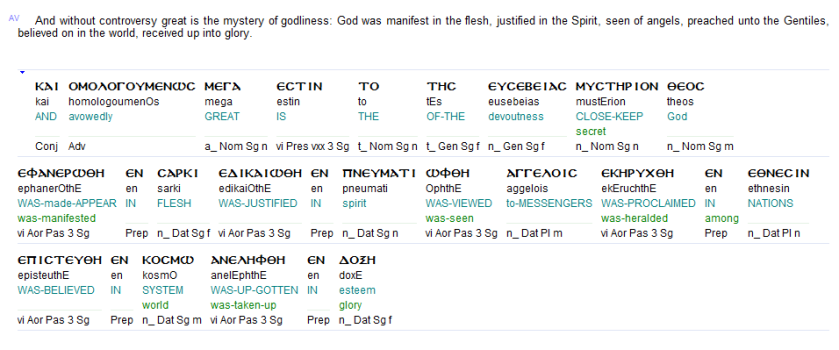No worries my friend

Welcome to Christian Forums, a Christian Forum that recognizes that all Christians are a work in progress.
You will need to register to be able to join in fellowship with Christians all over the world.
We hope to see you as a part of our community soon and God Bless!
No worries my friend

Yes, I know that you believe that, but actually (as indicated) I am more interested on what we can agree and what you can derive from the points I quoted, a few more -1. We know Jesus as only human (The Word (Logos) became Flesh)
2. We know the Father Created the Physical with Christ the Spiritual Creation in Mind (Logos)
3. We know Jesus is the Alpha and Omega, the first and the last, the beginning and the end (Rev) i.e
and the living one. I died, and behold I am alive forevermore Re 1:18.
F2F
I will list what has been proven from Scripture and extra-biblical texts.Yes, I know that you believe that, but actually (as indicated) I am more interested on what we can agree and what you can derive from the points I quoted, a few more -
Correct1. We know Jesus as the ONLY human
The Glory which God would Glorify His Son is the Same Glory God He has alway held - Also Romans 8:30 speaking of the Saints which is the same Glory.Who preexisted and knew His life with the Father when He was on Earth (John 17)
Context demands New Creation language sorry!2. We know Jesus with the Father was involved in the creation story (Col 1)
Correct - Jesus has a beginning and an end though Yahweh does not!3. We know Jesus is the Alpha and Omega, the first and the last, the beginning and the end (Rev)
Only in the Mind of the Father - i.e lamb slain from the foundation of the world!4. We know Jesus existed before creation, before humans were created and thus was a spiritual Being.
We know the Word of God went forth in the same manner as it did in Creation "God said..." but through the Power of the Holy Spirit gave conception in Mary and Jesus was given life.5. We know Jesus (as a spiritual Being) descended from heaven (John 3:13) and became (incarnated as) a human.
Are we in agreement so far?
Incorrect.Only in the Mind of the Father - i.e lamb slain from the foundation of the world!

Where did Creation - Physical and Spiritual originate?You are entirely mistaken to suggest that the Word/Memra was merely a concept in the mind of YHVH.
J.
You are completely wrong to claim that the Logos/Memra was merely a concept in the mind of YHVH.Where did Creation - Physical and Spiritual originate?
Are you suggesting the Mind of Yahweh is merely?
Again you state God's Logos is merely an expression of God's Mind.You are completely wrong to claim that the Logos/Memra was merely a concept in the mind of YHVH.
Your repeated errors-failing to take Scripture at face value and imposing ideas not present in the text-have led me to lose interest in your perspective.
J.
See how this backfires on you-Christ is the Word made flesh, the manifestation of Yahweh among men (1 Tim. 3:16).
1 Timothy 3:16 (ESV) states:
"Great indeed, we confess, is the mystery of godliness: He was manifested in the flesh, vindicated (justified) by the Spirit, seen by angels, proclaimed among the nations, believed on in the world, taken up in glory."

God was not in Sins Flesh BUT He revealed Himself through it in the Son of Man.NASB "He who was revealed in the flesh"
NKJV "God was manifested in the flesh"
NRSV "He was revealed in flesh"
TEV "He appeared in human form"
NJB "He was made visible in the flesh"
I will list what has been proven from Scripture and extra-biblical texts.
Correct
The Glory which God would Glorify His Son is the Same Glory God He has alway held - Also Romans 8:30 speaking of the Saints which is the same Glory.
You & @Johann continually write yourselves out of the Plan & Purpose of God through His Son Jesus?
Why do you both do this?
Error. Plain and simple.Everything, including Christ had it's origin in Yahweh (God), Father!
Answer @ProDeo's questions.God was not in Sins Flesh BUT He revealed Himself through it in the Son of Man.
Well done for posting multiple versions with the same meaning!
F2F
You speak on his behalf J?
As you well know "we" have well and truly refuted the Trinity from almost every angle!You are sabotaging what I wrote, changing the subject.
Correct. The Apostle Paul mentions this twice x2 here:1. We know Jesus was the ONLY human
I believe you are looking for Col 1:18Who preexisted and knew His life with the Father when He was on Earth (John 17)
Selective quoting now Pro?John 17:5 - And now, Father, glorify me in your own presence with the glory that I had with you before the world existed.
All I can agree with is your ignorance which appears to be growing stronger and stronger with each post - take care soon you may be like him who speaks on your behalf!Christ by His own words declared He preexisted with the Father before creation, thus Christ before creation wasn't a human but a spiritual Being.
Why can't you just say, I agree.
I leave the other 4 points what they are at the moment, let's agree on this one first.
You accuse others of veering off truth, but with each post you dig a hole for yourself-where did Messiah need redemption?In this context it implies that the Lord's sacrifice was not only for the salvation of others, but also for his own redemption.

